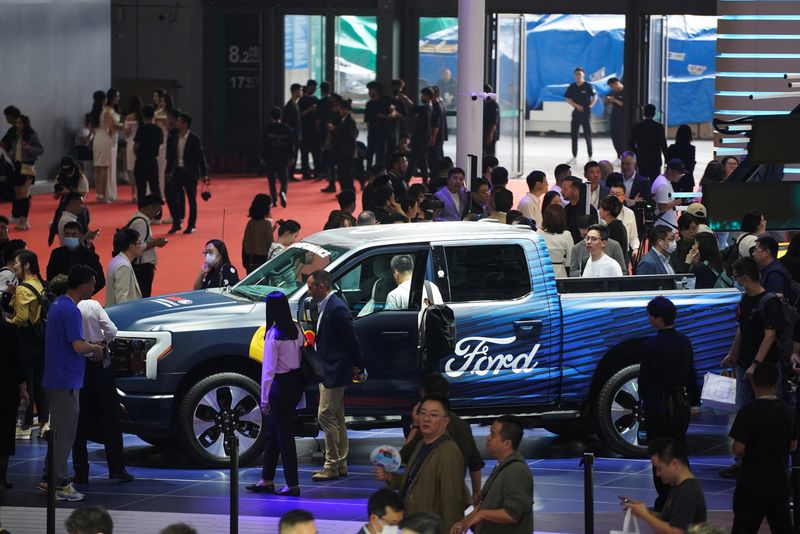By Nora Eckert
(Reuters) -Ford Motor Co posted first-quarter earnings on Wednesday that beat Wall Street's expectations, bolstered by a strong performance in its commercial vehicle division and an increase in its hybrid vehicle sales.
The company said it expects to achieve the higher end of its projected annual guidance of $10 billion to $12 billion in earnings before interest and taxes. Ford (NYSE:F) shares rose more than 3% in after-market trading on the news.
Still, Ford is grappling with what CEO Jim Farley called "a huge drag not just on Ford, but on our whole industry": electric vehicle production.
The carmaker recorded a $1.3 billion operating loss for its EV and software division in the first quarter. More broadly, executives expect this section of the company to sustain a pre-tax loss of between $5 billion to $5.5 billion for the year.
In the near term, hybrids are a top priority for Ford to ease customers into a battery-powered future, and the auto company aims to increase hybrid sales by 40% this year and quadruple them in the coming years.
Farley said he has walked back some of the Ford's EV ambitions to better match consumer demand. This month, Ford delayed the planned launches of three-row EVs in Canada and its next-generation electric pickup truck built in Tennessee. Executives have said they will not launch the next generation of Ford’s EVs until they can be profitable.
The EV business has proven tough not just for legacy automakers like Ford, but also for pure EV players like Tesla (NASDAQ:TSLA).
Elon Musk's company recently laid off 10% of its global workforce and on Tuesday posted the first decrease in quarterly revenue since the pandemic.
'CONTINUOUS MARCH DOWN'
Ford expects EV production costs to come down, but to be largely offset by intense pricing pressure from industry competitors, said Chief Financial Officer John Lawler.
"The last 12 to 18 months, it's just been a continuous march down on the top line, which is offsetting any of the savings we've had from a cost standpoint," he said of the EV business.
Ford is also shifting focus to producing larger electric trucks and SUVs, as well as affordable and smaller EVs that are being developed by a “skunkworks” team in California.
The company posted a rare 13% drop in quarterly revenue for its gas-engine business, which the company blamed on the launch of the new F-150 pickup truck.
The automaker will likely have slower, more deliberate launches in the future in its effort to root out costly quality issues, executives said.
The Dearborn, Michigan, automaker’s strong commercial business continues to fuel its bottom line, and the company is betting on software-related services in this division to drive profits in the coming years. That unit had operating profit margins of almost 17% in the quarter.
Ford posted quarterly adjusted earnings of 49 cents per share for the quarter ended March 31, compared with 63 cents per share a year earlier.
Analysts, on average, expected Ford to report an adjusted profit of 40 cents per share, according to LSEG data.
General Motorson Tuesday reported quarterly results that topped Wall Street targets and the automaker raised its annual forecast, citing stable pricing and demand for gasoline-engine vehicles.

Some analysts sounded a note of caution on the broader economic environment in which Ford and other automakers are operating.
"With auto inventories now at much higher levels and a higher-for-longer interest rate scenario unfolding, we expect new vehicle prices to remain under pressure and incentives to continue increasing," CFRA Research analyst Garrett Nelson said in a research note.